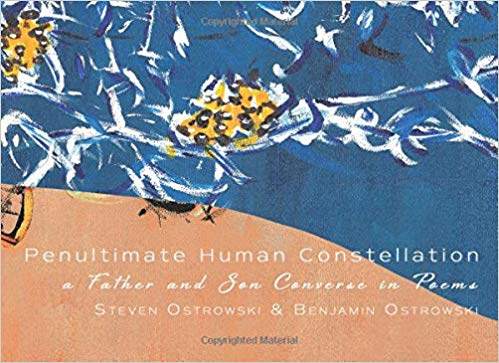Humanity has long searched for meaning and truth by looking toward the stars. Poets Steven and Benjamin Ostrowski believe we only need to look within ourselves. This father and son team present what they’ve learned and what they seek to know in their new book Penultimate Human Constellation: A Father and Son Converse in Poems (2018, Tolsun Books). Less an epistolary narrative and more like a private conversation over a long sleepless night, the Ostrowskis embark on their unique quest. We become privy to their efforts.
The father, Steven Ostrowski, teaches English at Central Connecticut State University and is an award-winning published writer. His son, Benjamin Ostrowski, is Ph.D. student at Carnegie Mellon University studying Organizational Behavior and has had his own poetry works published. Both gentlemen’s advanced academic backgrounds and literary pedigree may shed some light on this bold creative rumination about life. Through their lofty undertaking to communicate with “not just pens, though”, the enlightened poets desire to “build (their conversation) out of flashlights, juxtapose insights, / and not cave in to fear”. This allows them to emerge from behind society’s imposed mask of masculinity to share with one another (and the reader) their vulnerability and insecurity. The two appear to find strength from the sharing. Upon first glance, the stark imagery of the vast white space of the page looks to envelop the sparse little grey typeface. But the words and the enjambments find their place amidst this sea of nothingness. It is here that father and son bridge the literal and figurative generation gap in a poetic conversation that is always in constant motion. The book’s section “Poems from Southeast Asia; Poems from Southeast Connecticut” offers up the most poignancy. It is a dialogue in which Steven associates commonplace locations and things with home and wistfully remembers days long ago, while Benjamin excitedly juxtaposes his newfound freedoms and discoveries traveling abroad. “Pops” expresses both of joy and sorrow for his son a half a world away, while “Bud” reveals both wonder and uncertainty in his strange surroundings. The topics presented are as fleeting as thoughts, but linger just long enough for senior and junior to add his own riff. Reading feels like a jazz piece composed of equal and perfect measure by the performers: I don’t believe we’ll comprehend the cosmic duet until we do it is why I’ve always loved singing with you. The book finally concludes the cosmic conversation with each poet examining what they have learned from this special experiment. “The real questions just won’t shut up, will they? / This one’s driven me out of the house, flung my eyes / into the sky to peer through those gaping night doors, ornate as / cathedrals,” states father. The son offers no good answer: “Pops, man, they will not shut up / those matters / gathered clouds just out the doors / the bits we don’t see reminding us we’re so tired / that the next-next-next pain won’t be the last.” They realize as we all do that the answer isn't always as clear as we would have hoped. But it becomes obvious that “Pops” and “Bud” crossed the generation gap successfully. Point of inquiry: what is the exact reason for the use of the word “penultimate” in the book’s title? Penultimate is not a superlative for “last” or “best”, but rather it means “second to last.” One can speculate the last, ultimate human constellation will be achieved with God or the Universe or perhaps within ourselves. When we come together to share and learn, that is when true connection occurs. Here, the poets prove to us that by connecting with family, sharing love is the second-best achievement we can hope for in this life.
Ultimately, the most satisfying aspect about Penultimate Human Constellation is that we are witness to the simple special bond shared between a father and his son. This bond is the heart that beats life into every page. The “family ties that bind” theme is quite prevalent. The book is dedicated to the memory of family patriarch Ben, a beloved father, and grandfather, and coupled with an epigraph credited to Friedrich von Schiller, “It is not flesh and blood, but heart which makes us fathers and sons”. The importance of family is driven home to the reader. Humanity may continue try to find understanding by looking to outer space, but poets Steven and Benjamin Ostrowski have successfully shown us we need only to look to our own inner space for what we are really seeking.
0 Comments
Leave a Reply. |
Archives
July 2024
Categories
All
|
|
Glassworks is a publication of Rowan University's Master of Arts in Writing 260 Victoria Street • Glassboro, New Jersey 08028 [email protected] |
All Content on this Site (c) 2024 Glassworks
|


 RSS Feed
RSS Feed
